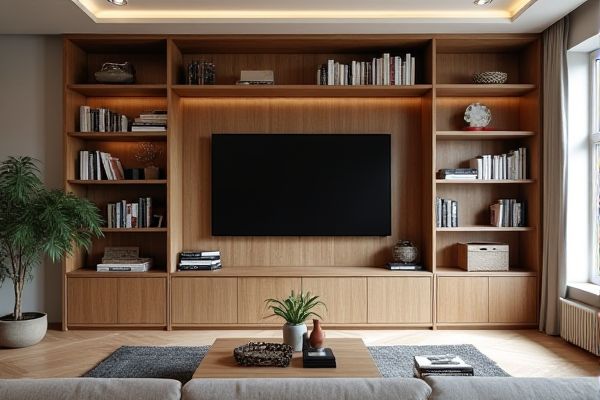
A modular bookcase offers flexibility and easy reconfiguration, adapting to changing storage needs, while a built-in bookcase provides a permanent, custom-fitted solution that maximizes space and adds architectural value to your home. Discover how to choose the best option that fits your style and space requirements by reading the full article.
Table of Comparison
| Feature | Modular Bookcase | Built-in Bookcase |
|---|---|---|
| Installation | Easy, plug-and-play assembly | Permanent, requires professional installation |
| Customization | Flexible, reconfigurable units | Tailored design to space and style |
| Cost | Generally lower, affordable options | Higher, due to materials and labor |
| Space Utilization | Less efficient; standard sizes | Maximized use of available space |
| Mobility | Portable and easy to relocate | Fixed, permanent structure |
| Design Impact | Varied styles, less cohesive look | Seamless integration with interior |
| Durability | Depends on material and build quality | Typically more durable and sturdy |
Introduction: Comparing Modular and Built-In Bookcases
Modular bookcases offer flexible storage solutions with easy customization and relocation, while built-in bookcases provide a permanent, seamless integration into your room's architecture. Choosing between the two depends on your space, design preferences, and whether you prioritize adaptability or a tailored, fixed installation. Your decision will affect room aesthetics, installation complexity, and long-term usability.
Design Flexibility and Customization
Modular bookcases offer exceptional design flexibility, allowing you to easily rearrange, expand, or adapt the units to fit changing spaces and storage needs. Built-in bookcases provide a high level of customization tailored to your room's architecture, seamlessly integrating storage with walls for a cohesive and polished look. Choosing between the two depends on whether you prioritize adaptability or a permanent, custom-designed feature in your living space.
Space Considerations and Room Layout
Modular bookcases offer flexibility in space utilization by allowing easy reconfiguration and relocation to fit varying room dimensions and layouts. Built-in bookcases maximize wall space efficiency and seamlessly integrate with the room's architecture but require fixed placement and professional installation. Selecting between the two depends on the room's available space, the need for adaptability, and the desired aesthetic integration.
Installation Process and Requirements
Modular bookcases offer a straightforward installation process with minimal tools needed, allowing for flexible placement and easy assembly tailored to your space. Built-in bookcases require professional installation, involving wall framing, securing to studs, and custom finishing to ensure integration with existing architecture. Your choice impacts time, cost, and the level of customization based on your room's structural requirements.
Cost Analysis: Modular vs Built-In
Modular bookcases generally offer a cost-effective solution with lower upfront expenses and flexible pricing based on materials and size, making them ideal for budget-conscious buyers. Built-in bookcases involve higher initial costs due to custom design, professional installation, and potential structural modifications, but they add long-term value by integrating seamlessly with home architecture. Choosing between modular and built-in options depends on balancing immediate affordability against investment in personalized, permanent storage solutions.
Durability and Material Choices
Modular bookcases offer flexibility with materials like engineered wood and metal, but built-in bookcases typically use solid wood or high-quality plywood, providing superior durability and long-term stability. Built-in units are custom-fitted to your space, reducing wear from movement and enhancing structural integrity. Your choice should consider the trade-off between modular adaptability and the lasting strength of built-in craftsmanship.
Storage Capacity and Functionality
Modular bookcases offer adjustable shelves and various configurations, allowing customizable storage capacity suited to changing needs, while built-in bookcases maximize wall space with fixed dimensions for seamless integration. Built-in units often provide increased stability and can incorporate additional functional elements like integrated lighting or cabinetry. Modular systems excel in flexibility and portability, making them ideal for renters or spaces requiring frequent reorganization.
Aesthetic Appeal and Style Options
Modular bookcases offer versatile aesthetic appeal with customizable shapes, colors, and materials that fit modern or eclectic styles, while built-in bookcases provide a seamless, integrated look that enhances traditional or minimalist interiors by matching architectural details. Modular units can be easily reconfigured or relocated, allowing dynamic style changes, whereas built-in designs create a permanent, polished appearance that adds value and character to a room. Both options cater to distinct design preferences, with modular bookcases emphasizing flexibility and built-ins prioritizing cohesion and craftsmanship.
Maintenance and Future Upgrades
Modular bookcases offer easy maintenance with removable shelves and components, allowing quick cleaning and hassle-free repairs. Built-in bookcases, while sturdy and seamless, may require professional help for maintenance or upgrades due to their fixed structure. Your choice impacts long-term flexibility; modular units enable simple future design changes, whereas built-ins provide permanent customization tailored to your space.
Which Bookcase is Right for Your Home?
Modular bookcases offer flexibility and ease of customization, making them ideal for renters or those who frequently change their interior design. Built-in bookcases provide a seamless, permanent solution that maximizes space and enhances home value, perfect for long-term homeowners seeking a tailored fit. Choosing between modular and built-in depends on your budget, space constraints, and whether you prefer a temporary or integrated storage option.
 homyna.com
homyna.com